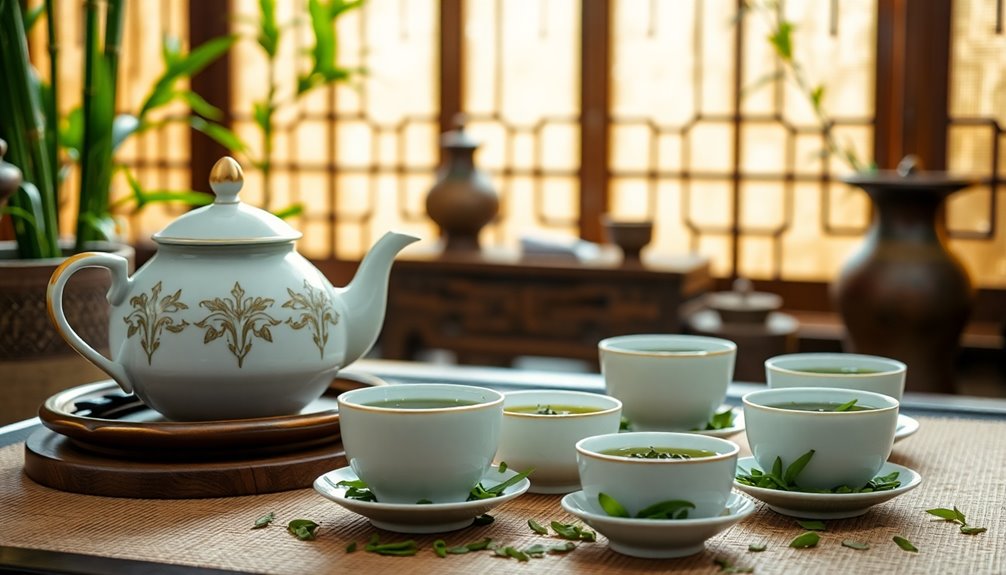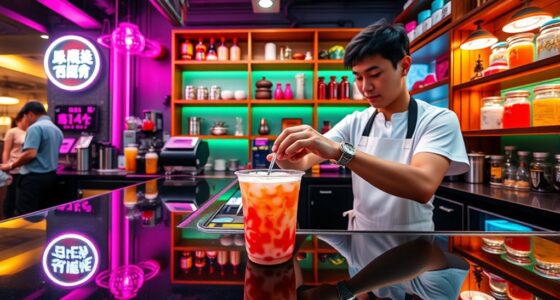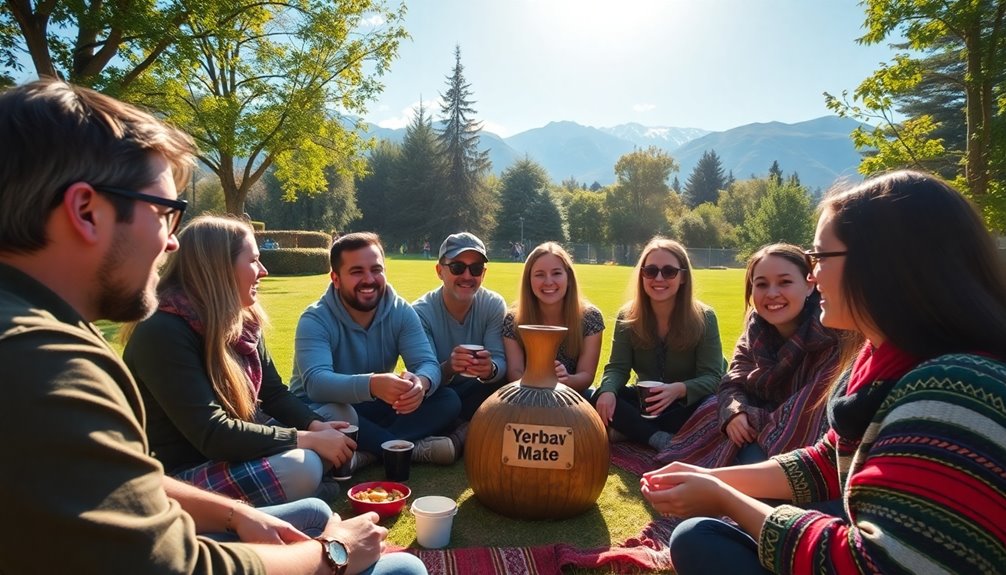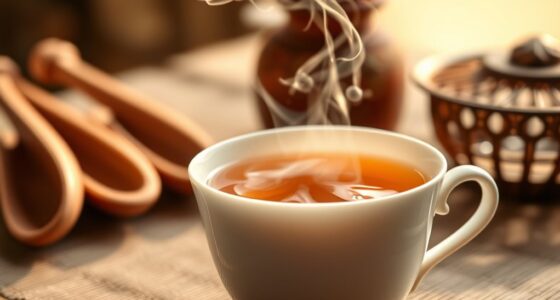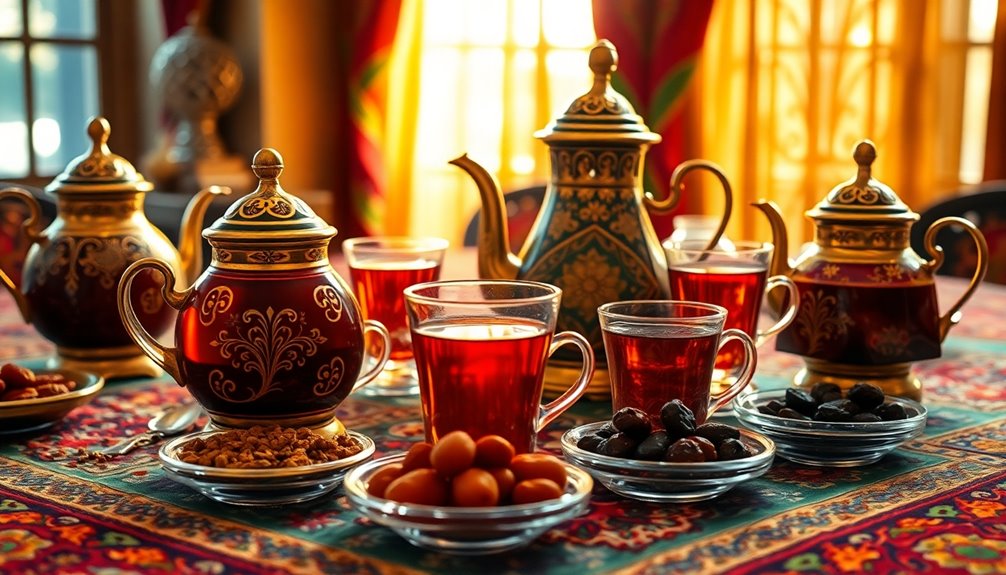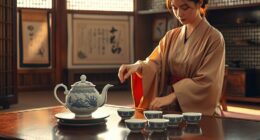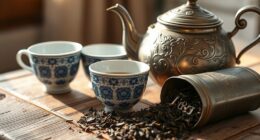Chinese tea culture greatly influences modern practices by enhancing social rituals and promoting mindfulness. When you share tea at gatherings, it signifies respect and deepens connections. Practices like Gongfu Cha showcase skill and appreciation for tea's flavors—making tea time a delightful experience. Tea ceremonies can also promote peace and harmony in both personal and diplomatic settings. Visiting modern tea houses offers you a chance to explore diverse selections, all while enjoying health benefits. So, whether you're brewing tea for yourself or hosting friends, you're participating in a rich tradition that adds joy and connection to life. Keep exploring to find out more!
Key Takeaways
- Modern tea houses often incorporate traditional Chinese tea culture, offering diverse selections and fostering social connections among patrons.
- The practice of Gongfu Cha influences contemporary tea brewing, emphasizing skill and mindfulness in preparation.
- Tea ceremonies adapted from Chinese customs are increasingly popular in social gatherings, enhancing relationships and fostering harmony.
- Mindfulness practices during tea preparation and consumption promote relaxation and inner peace, reflecting ancient Chinese spiritual dimensions.
- Chinese tea culture's emphasis on hospitality continues to shape modern social rituals, reinforcing respect and appreciation for guests.
Introduction
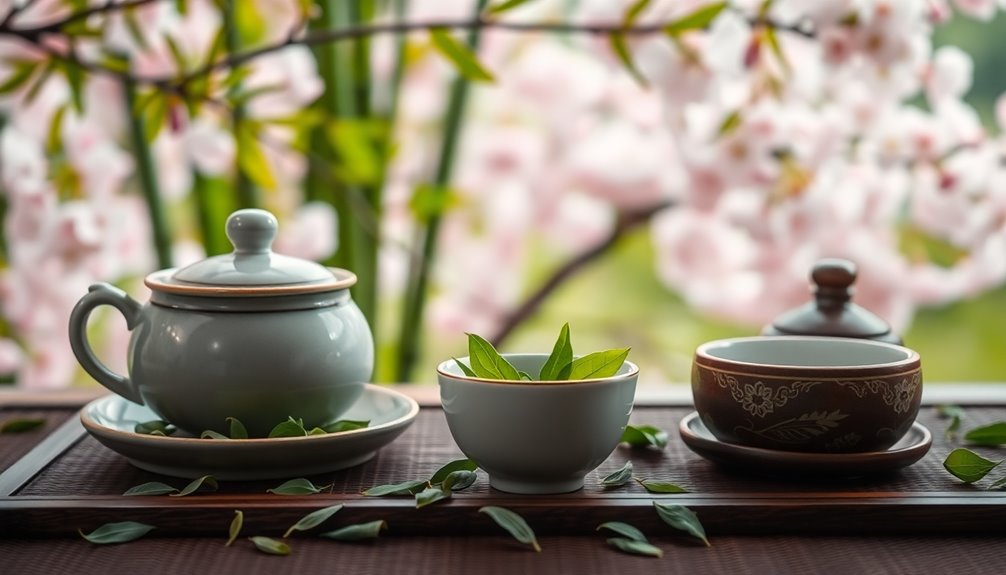
Chinese tea culture's rich history spans over 4,000 years, deeply influencing how tea is prepared and enjoyed today. This vibrant tradition emphasizes the importance of rituals, which give tea its special place in social gatherings.
You might've heard of Gongfu Cha, a method that showcases skill and precision in brewing. This technique is popular for both casual get-togethers and formal tea ceremonies, allowing you to appreciate every sip.
In modern China, tea houses still reflect traditional practices, serving tea as a way to foster connections and show hospitality. You'll find that the variety of teas available, like green, black, and oolong, not only adds excitement but also offers numerous health benefits.
With the growing interest in these benefits, more people are embracing different tea varieties around the world.
Today, there's a revival of traditional tea practices, reinforcing tea as a cultural emblem and a reflection of national identity. As you explore Chinese tea culture, you'll discover how these elaborate tea ceremonies and the deep-rooted customs can enhance your understanding and appreciation of this timeless beverage.
Tea's Role in Social Rituals

Hospitality shines through as well—offering tea during holidays reflects appreciation for guests and adds to the festive spirit.
Moreover, tea gatherings often serve as a peaceful means of conflict resolution, promoting harmony and understanding among friends and family.
Whether you're enjoying a tea ceremony or simply sharing a cup, tea's role in social rituals is a cherished part of Chinese culture that brings everyone closer together.
Tea as a Spiritual Practice
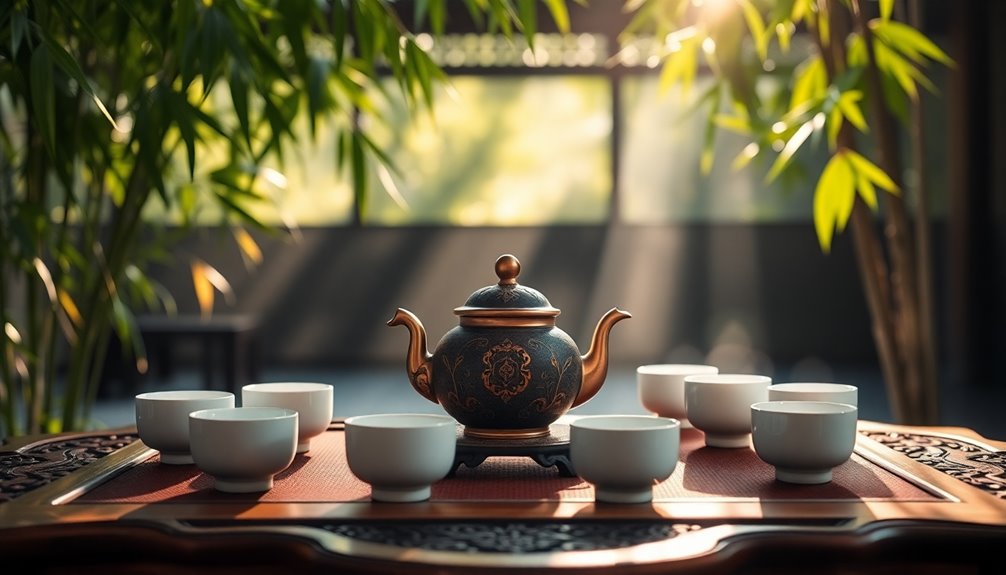
Tea holds a profound spiritual significance that transcends mere consumption; it's a pathway to mindfulness and inner peace. When you engage in tea as a spiritual practice, you're stepping into a world of tranquility and reflection.
This journey often begins with Gongfu Cha, an artful method of tea preparation that emphasizes respect for the tea leaves and the moment. As you brew tea, take time to appreciate the process. Focus on each step, from selecting the leaves to pouring the water. This not only helps you connect with the tea but also fosters a sense of presence.
You might recall the teachings from the Classic of Tea by Lu Yu, which highlight the deep spiritual dimensions of tea. In many cultures, tea is linked to Buddhist rituals, where it's offered mindfully to deities, helping you cultivate a spiritual connection.
Tea's Role in Diplomacy
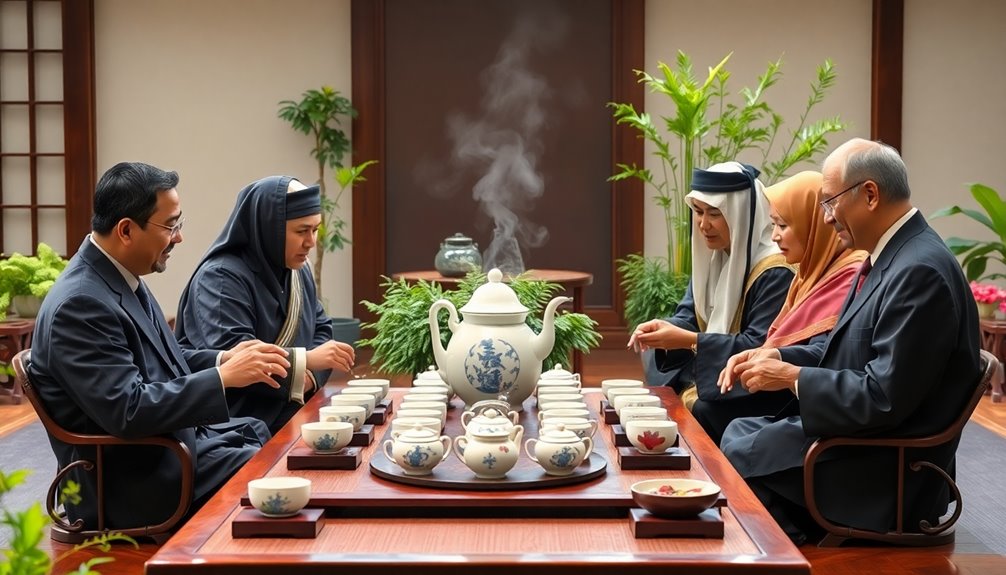
How does something as simple as a beverage become a powerful tool in diplomacy? In China, tea culture plays a crucial role in building relationships and fostering goodwill. When you offer tea to guests, it symbolizes respect and shows you value their presence. This ceremonial presentation of tea during official meetings highlights cultural values and can ease tensions, helping everyone feel more comfortable.
Tea ceremonies aren't just traditions; they're strategic diplomatic tools. High-profile international events often include these ceremonies to honor guests and strengthen connections. By sharing premium Chinese teas, you showcase China's rich tea heritage while demonstrating hospitality. It's a thoughtful gesture that can leave a lasting impression.
In today's world, modern diplomatic dialogues frequently incorporate tea-related events. These gatherings reinforce cultural ties and mutual respect among nations, making the atmosphere warmer and more inviting.
When you sip tea with someone, you're not just sharing a drink; you're creating a space for open communication and understanding. So, next time you enjoy a cup of tea, remember its power in diplomacy and the connections it can help foster.
Cultural Appropriation of Tea Rituals
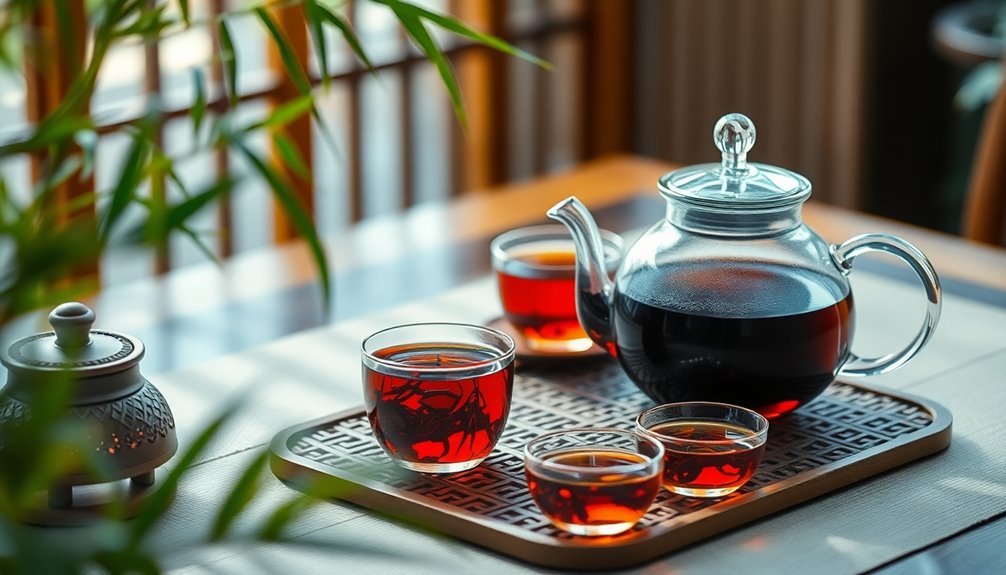
To appreciate Chinese tea culture fully, it's essential to understand its roots and the meanings behind the tea rituals.
By doing so, you can enjoy these practices in a way that honors their rich heritage.
Practical Applications
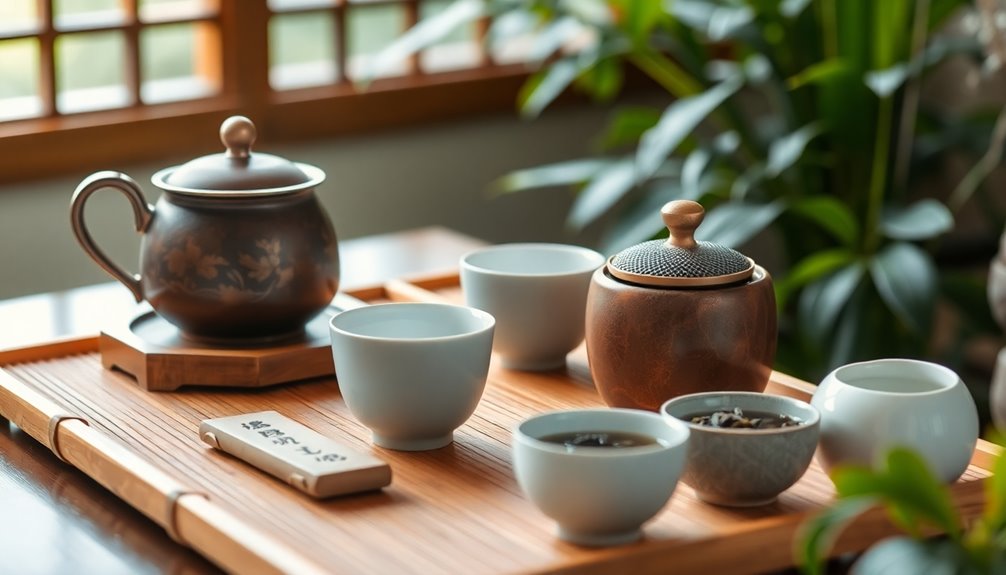
Incorporating elements of Chinese tea culture into your daily routine can enhance not just your tea experience but also your overall well-being.
Start by embracing the traditional Chinese tea ceremony, known as Gongfu Cha. This method emphasizes skillful brewing, allowing you to appreciate the rich flavors of various tea varieties. You can use small teapots and try multiple steepings for a delightful experience.
Visit modern tea houses that celebrate these practices. They often offer a wide selection of teas, showcasing the health benefits of each. You'll find teas packed with antioxidants, like green tea, and polyphenols found in black tea, perfect for boosting your health.
Make tea time a moment of mindfulness. Set aside time to relax, sip, and enjoy the process of brewing. This can help you unwind after a busy day and promote social connection with friends or family.
Share your tea journey with others, creating memorable experiences around the table. By adopting these practices, you'll discover that tea isn't just a drink; it's a way to enhance relaxation, connect with others, and celebrate a rich culture.
Enjoy every sip!
Frequently Asked Questions
What Is the Significance of Tea in Chinese Culture?
Tea's significance in Chinese culture lies in its role as a symbol of hospitality, connection, and mindfulness. You'll find it central to traditions, ceremonies, and daily life, reflecting respect and fostering social bonds among people.
What Was the Impact of Tea in China?
Tea has profoundly shaped China's economy, diplomacy, and social customs. You'll find its influence in trade dynamics, cultural practices, and historical events, highlighting tea's role as a symbol of hospitality and national identity.
How Did Tea Impact the World?
Tea's impact on the world's social customs and trade is undeniable. You've seen it transform gatherings into elegant affairs, boost economies, and inspire wellness trends, all while fostering connections across cultures and promoting mindful consumption.
How Did Tea Transform Chinese Society?
Tea transformed Chinese society by evolving from a medicinal drink to a social staple. You share connections over tea, strengthen bonds through etiquette, and engage in cultural exchange, making it essential for community building and hospitality.
Conclusion
In conclusion, the influence of Chinese tea culture is all around us! Whether you're enjoying a cup with friends, finding calm in a tea ceremony, or even sharing a brew during important talks, tea brings people together. By embracing these traditions, you can enrich your own life and connect with others. So, next time you sip your tea, remember the rich history behind it, and let it inspire you to create your own tea moments!

